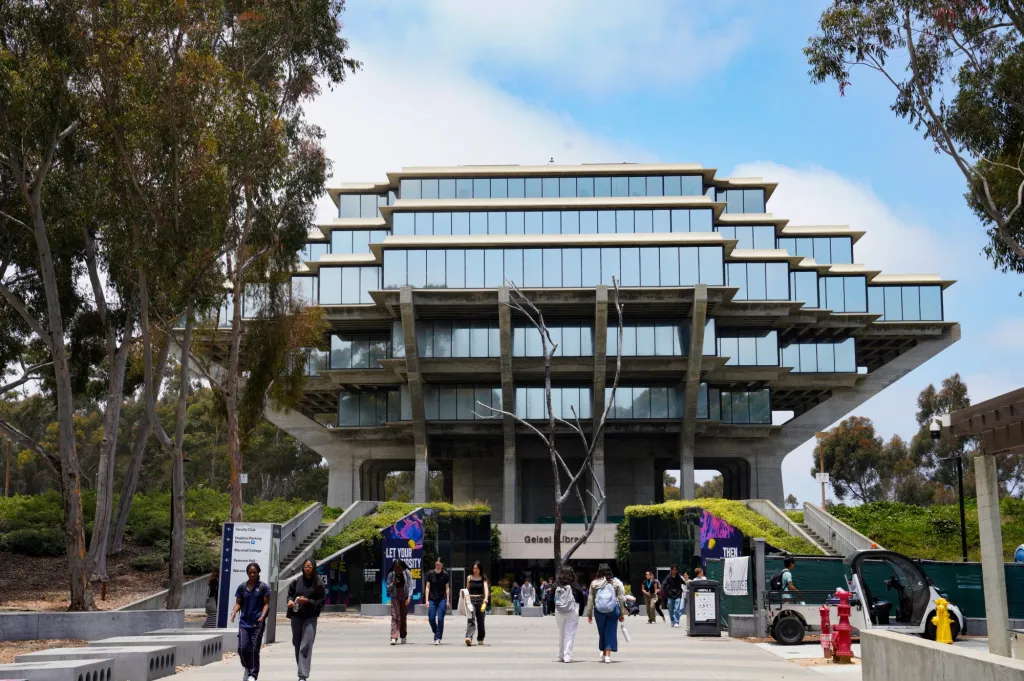Copyright San Diego Union-Tribune

UC San Diego and the San Diego Foundation have agreed, as part of a legal settlement, to allow students of all races and ethnicities to apply for a scholarship that was previously only available to Black students, according to the group that sued the university over allegations of racial discrimination. The Californians for Equal Rights Foundation, or CFER, filed its lawsuit in July alleging the Black Alumni Scholarship Fund was unconstitutional and “racially exclusive” because it was only awarded to Black students. The lawsuit alleged that UCSD and Chancellor Pradeep Khosla had full knowledge that the scholarship, which was established in 1983 and administered by the San Diego Foundation since 1998, “discriminates based on race.” On Monday, after very little public litigation in the federal lawsuit, CFER and its attorneys announced that UCSD had agreed to change the name of the scholarship to the Goins Alumni Scholarship Fund and open it up to non-Black students. CFER and its attorneys subsequently asked a judge Monday to dismiss the case. “This victory proves that the Constitution’s promise of equality before the law still has teeth,” Jack Brown, the lead attorney from the Pacific Legal Foundation, which represented the plaintiffs, said in a statement. “The Ku Klux Klan Act was written to stop government actors from conspiring with private parties to discriminate — and that’s exactly what happened here. When faced with the law, UCSD and its affiliates had no choice but to retreat. The action here is exactly what we demanded in our lawsuit.” The Ku Klux Klan Act is another name for the Civil Rights Act of 1871, which according to the Federal Judicial Center, “was designed in large part to protect African Americans from Klan violence during Reconstruction.” The act gave those deprived of a constitutional right by someone acting under color of law the ability to seek relief in federal court. Congress later codified that act in the United States Code, and it’s now one of the main federal laws used by victims of police violence to hold officers accountable for violating their civil rights. In this lawsuit, the racial dynamic of the Ku Klux Klan Act was turned on its head, with the plaintiffs alleging that UCSD and the San Diego Foundation were illegally conspiring to unfairly favor Black students and discriminate against non-Black students. The plaintiffs — including UCSD junior Kai Peters, who is White, and other unnamed, non-Black CFER members — alleged they “have suffered and continue to suffer injuries as a direct and proximate result of Defendants’ racially discriminatory conduct … The denial of access to educational resources on the basis of race has caused them tangible harm, including lost opportunities for financial support, mentoring relationships, and professional development.” In a statement, UCSD said it was pleased the lawsuit was amicably resolved. “We are grateful to all of our community supporters who have generously given to fund scholarships for UC San Diego students and we are committed to complying with all federal and state anti-discrimination laws,” the university statement said. A spokesperson for the San Diego Foundation — a charitable organization and the region’s largest community fund that provides grants to other local nonprofits — declined to answer questions about the settlement, citing a policy of not commenting on litigation matters, even once closed. The Foundation did not mention the settlement when it announced last week that it had renamed the scholarship fund after its founder, Lennon Goins, a UCSD alumnus who for decades ran a dental practice near the university. “Dr. Goins came from a poor sharecropper family in the South and exemplifies for all of us the power of education to transform lives,” Ed Spriggs, the chair of the scholarship fund’s executive committee, said in the news release. “This scholarship ensures his passion and generosity live on through the success of UC San Diego students.” Spriggs, a retired associate vice chancellor at UCSD who founded the Black Student Union while a student on campus in the 1960s, was also named as a defendant in the lawsuit. He did not respond to questions about the settlement or the scholarship fund’s name change. The scholarship fund was established to help increase the proportion of Black graduates from UCSD and to ease their financial burden while obtaining a degree. A 2024 report from the American Council on Education found that Black students and other racial minorities continue to earn degrees and stay enrolled through graduation at lower rates than their White and Asian counterparts, and a higher proportion of Black students graduate with student loan debt than other racial groups. While the U.S. Supreme Court struck down race-conscious affirmative action in higher education in 2023, California has banned race-based affirmative action since 1996, when California voters passed Proposition 209. That vote prohibited race, gender and ethnicity-based affirmative action in public education, as well as public employment and public contracting. CFER — a nonprofit that asserts on its website that “the woke culture is destroying America and its future generations” — seeks to enforce that prohibition. Earlier this year, CFER and its attorneys from the Pacific Legal Foundation settled a lawsuit against the San Diego Housing Commission over a first-time homebuyer pilot program that was designed to help people of color. As part of the settlement, the housing commission dropped the requirement that applicants be Black, Indigenous or people of color. In the scholarship fund lawsuit, CFER and its attorneys alleged that UCSD transferred its administration of the scholarship fund to the San Diego Foundation in 1998, after the passage of Proposition 209, “in an effort to avoid the prohibition on racial preferences in public education.” “The university’s swift capitulation vindicates not only the plaintiffs’ rights but the broader principle that no public institution may outsource discrimination to private hands,” the Pacific Legal Foundation said in a news release. “The new Goins Alumni Scholarship Fund will base awards on merit, leadership, volunteer service and financial need — without regard to race.” Staff reporter Gary Robbins contributed to this story.



